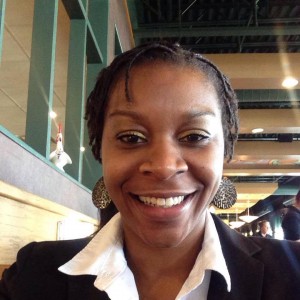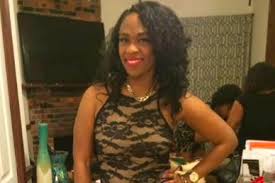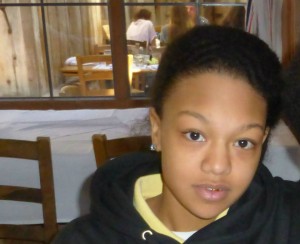Our first lesson could easily be and should be translated:
2 Sam 11:4 David sent emissaries to kidnap Bathsheba and she came to him then he raped her. Then she cleansed herself from her defilement and returned to her house. 5 [After some time] the woman conceived; and she sent and told David, “I am pregnant.” (translation, Wil Gafney)
These are hard words. These are hard times. Hard times call for hard words.
Let us pray: Holy One of Old, open our ears that we may hear. Amen.
 [Note: all of the tweet links are broken. I’ll fix them when I can.] As Alicia Garza, Patrisse Cullors and Opal Tometi watched Trayvon Martin being put on trial for his own murder they created the hashtag #BlackLivesMatter. Many have joined the movement and when others have tried to hijack the prophetic proclamation by focusing only on black male lives or heterosexual or cissexual black lives we who agitate and protest in social media and in the streets remind and correct them: all black lives matter. [tweet this] Black women’s lives matter. Black lesbian, gay, bisexual and transgender lives matter. Black Muslim lives matter. All black lives matter because black life is sacred. [tweet that] The lives of Sandra Bland, Kindra Chapman and Jasmine Wright cut short this past week matter because they were the very image of God and someone could not or chose not to see God in them.
[Note: all of the tweet links are broken. I’ll fix them when I can.] As Alicia Garza, Patrisse Cullors and Opal Tometi watched Trayvon Martin being put on trial for his own murder they created the hashtag #BlackLivesMatter. Many have joined the movement and when others have tried to hijack the prophetic proclamation by focusing only on black male lives or heterosexual or cissexual black lives we who agitate and protest in social media and in the streets remind and correct them: all black lives matter. [tweet this] Black women’s lives matter. Black lesbian, gay, bisexual and transgender lives matter. Black Muslim lives matter. All black lives matter because black life is sacred. [tweet that] The lives of Sandra Bland, Kindra Chapman and Jasmine Wright cut short this past week matter because they were the very image of God and someone could not or chose not to see God in them.

And when folk want to turn away from the death that is stalking black lives in the streets, in the church, in police custody, in WalMart, in public parks and in the case of 7 year-old Aiyana Stanley-Jones, shot by a cop in her own little bed, we say no. Don’t look away. Don’t change the subject. You don’t go to a breast cancer rally and change the subject to all cancer or another disease or all the people who aren’t killed by cancer or even blame folk for behavior choices that you think may have contributed to their cancer.
That’s what the folk who invented the all lives matter hashtag in response to black lives matter were doing. [tweet this] We said black lives matter. They said no, all lives matter. They said we will not acknowledge that black life is under siege. We will change the subject. We will look away.
We have a hard time talking about race in this country. At this moment we are looking at an escalating tide of black death and some of us are saying black lives matter. In the church we should also say Black life is sacred.
Our scriptures teach we are all created in the image of God. That is easy to say. Our history and our very present demonstrate that some of are not counted in that “we.” Our own Episcopal Church told my enslaved ancestors that freedom in Christ didn’t mean freedom from slavery. They would be free when they died. We weren’t counted in that “we.” The founders of this nation, many of whom were also founders of the Episcopal Church, both founded in my home Diocese of Pennsylvania, had no trouble excluding people of African descent from “we the people.” (Yes, they excluded others but we’re not going to look away or change the subject.) [tweet this] Those founders for whom the bible was scripture could appeal to its pages to support slavery. Yes, Paul said there is neither slave nor free – but he told Onesimus who freed himself from slavery he had to return to slavery and his master and also wrote “slaves obey your masters.” [tweet this] And for all his talk about freedom, Jesus never freed any slaves.
In the biblical world just as in ours there were people who counted and people who didn’t. Often those people were identified by ethnicity. Race as we know it didn’t exist in the biblical word but ethnicity functioned very much as it does now. Ethnicity in antiquity and modernity is identity rooted in people and place often with distinct language and cultural attributes. In their scriptures Israelites were the people who mattered and non-Israelites often did not. For me there is more than a little irony in Gentile Christians claiming the scriptures of Israel as our heritage. And, whether Israelite or non-Israelite, women in the scriptures often – but not always – but all too often – were treated as though they didn’t matter. And yes, there are those texts where women and foreigners and even foreign women turn the tables on exclusion and bias but don’t rush to those texts too quickly. Don’t look away from what is hard to see just yet.
Part of what is so infuriating to many us in the Black Lives Matter movement is that all too often our fellow God-crafted citizens whom we pay, support and need as police officers are killing us and our children. They have the power of the state at their disposal, a sacred trust to use lethal force only for the protection of all of us, for our common good. But some of them abuse that power. [tweet this] The sheer scope of extrajudicial killings of black folk by police is an abuse of power. Some take it further like Officer Daniel Hoytzclaw who spent his on-duty time targeting black women for sexual assault. [tweet this] He took at least 13 black women like David took Bathsheba. Don’t look away.
The church has a history of looking away. The church has looked away from David’s abuse of his power, running to his repentance. Don’t look away. [tweet this] The church has even looked to Bathsheba blaming her – some call her rape adultery – looking at her instead of David just as some folk have blamed victims of police killings: if they had just done what they were told… If she hadn’t mouthed off… The penalty for non-compliance and being mouthy is not summary execution, not in these United States. Besides, compliance won’t save us. Don’t change the subject. Don’t shift the blame. Don’t look away from the abuse of power in this text.
Hold David responsible for his actions. I tell my students and the preachers I mentor not to say “Bathsheba was raped” but to say “David raped Bathsheba.” When he sent his men to take her she didn’t have the option of saying no. She was a stranger in a strange land, her husband was away fighting his war and then he took her, raped her and tried to discard her. Having to prove David raped Bathsheba is uncomfortably similar to the plight in which many women and girls find themselves, having to prove to the police and general public that they were raped.
God, the prophet Nathan and the scriptures are clear that Bathsheba was not at fault for David’s sin. Only he is accused and held accountable. But the text doesn’t regard David’s rape of Bathsheba as a crime against her. In the bible her rape is a crime against her husband. That’s hard for me. But I won’t look away. As an Episcopalian and a biblical scholar I know the bible is more often descriptive than prescriptive, describing things as they were and not as they should be. [tweet this] We are called to learn from, not always imitate Iron Age theology. We are also called to look for those spaces where every once in a while Iron Age theology is revolutionary and revelatory. So don’t look away when the text and even God are hard to look at or you might miss it.
David who was so handsome when we met him is ugly in this text. David rapes because he can. Rape is about power and domination. It is not about sex. [tweet this] David had sex partners. He was married like so many other rapists. David has been engaged to Saul’s daughter Merab, then married to her sister Michal then married to Abigail after her husband died and, on the way home with Abigail he stops off and picks up Ahinoam.] Before he sends men to abduct Bathsheba so he can rape her, David has sexual access to a minimum of six wives whom we know, seven if you count the banished Michal and an unknown number of Saul’s wives whom he inherited. That does not include servants – or slaves since they could not say no – and prostitutes with which Israelite men could have sex without consequence because adultery at that time was only having sex with a married or engaged woman.
[Now those of you who have medical or public health training, tell me what does a person with multiple sexual partners run the risk of, particularly when those partners have more than one sexual partner themselves? Listen to David’s words in Psalm 38:5 My wounds grow foul and fester
because of my foolishness;
6 I am utterly bent over and prostrate;
all day long I go around mourning.
7 For my loins are filled with burning,
and there is no soundness in my flesh.
To cover up his crime, David killed Bathsheba’s husband. And as a result she had no place else to go. I guess she could be grateful that David didn’t just kill her too. I wonder if she had had a choice would she have chosen death over marrying her rapist. Perhaps some days the answer was yes. Sadly, all that most people seem to remember about Bathsheba is the worst day of her life, maybe the worst two or three days: the day David raped her, the day David killed her husband, the day she realized she would have to marry her rapist. I don’t know how she did it. But it seems to me that she made up her mind to have the best life she could under the circumstances. I imagine that she said to David, “You are not going to shut me away like you did your first wife Michal. You stole the life I had with my husband. You stole our future and you stole our children. I can’t get that back but I can have your children and the security that comes with them. It’s good to be king and I will be the mother of kings.”
I don’t know if she really said that, but that’s what I imagine her saying. I have to imagine something because she keeps living and sleeping with David, having his babies – four of them – in spite of everything that he has done to her and her husband. She stayed in that marriage like so many women married to a monster with no place to go. I’m not saying that women who are being abused or even raped by their husbands should stay with them. I am simply acknowledging that she had no other choice, and that in our time many women feel like they have no choice either. Bathsheba made the best she could out of the situation.
In so doing she changed the course of history. Bathsheba and the prophet Nathan decide between them, without an old, then-impotent David at the end of his life, that her son Solomon and not David’s oldest son Amnon or even his favorite, Absalom will be king. [tweet this] Bathsheba put her son on the throne. And after David died, Solomon put her on a throne. In 2 Kings 2, Solomon enthrones his long-suffering mother who has survived her rape, her rapist and their forced marriage. Bathsheba became the right-hand woman in the kingdom. And when Solomon got up off of his throne and bowed at her feet, everyone else in the throne room did too.
Solomon learned it’s good to be king and followed in the footsteps of his father David. Where did you think he got the habit of collecting women? It is good to be king. But Jesus didn’t want to be king. He knew that there was nothing romantic about being king. Many monarchs, kings, some queens and pharaohs – male and female – were bloodthirsty, power-hungry, egomaniacal and rapists. [tweet this] David and Solomon represented the golden age of Israelite monarchy and Jesus didn’t want to be anything like them. David and Solomon collected women for their own personal use. [tweet] Jesus collected and respected women disciples like Mary Magdalene, the Apostle to the Apostles whose feast was this past Wednesday.
Yet the Church and the scriptures have given the title “king” to Jesus. His disciples then and now never seem to get that he never wanted to be king. In today’s Gospel, after he has demonstrated his power by feeding five thousand people with a child’s lunch Jesus has to run away and hide because the people want to make him king. Just after his resurrection and ascension, the disciples asked again, “Now are you going to restore the kingdom?” If he could raise himself from death to life surely he could put Herod and even Caesar to death. Because the one sure way to become king was to kill the previous king. But Jesus would die, not kill.
[tweet this] Kings take. But Jesus gives. A king will take your sister, wife or daughter. But Jesus gives women dignity. A king will take and tax your crops. But Jesus gives the Bread of Heaven and earthly food to the hungry. [tweet this] A king will take your life if you get in his way, but Jesus gives eternal life.As king David had the power of life and death at his command. He used that power to rape and murder. There were good kings in Israel and terrible kings and kings who did good things and terrible things. There are good people and horrible people with the power of life and death over others. And there are people who do good things and terrible things with the power of life and death over others. Some of those things are so terrible we may want to look away and change the subject. [tweet] But the lesson of Bathsheba and Black Lives Matter is that the victimized and the vulnerable matter to God and none of the biases of text or culture, in the Iron Age or this age will ever change that.
In the Name of God who is Love, Jesus the Love that is stronger than death and the Holy Spirit who covers us and fills us with her Love. Amene.

Dr. Irie L. Session
July 26, 2015 8:24 pmWow! Thank you for expanding my thinking, yet again.
Frederick D. Haynes
July 27, 2015 2:32 amPowerful! Challenging! Disruptive! Eye-opening! Prophetic! Thank you!!
Delman Coates
September 7, 2015 10:42 amThank you so much for this prophetic reading of a familiar narrative! WOW! I have been so looking forward to reading this. Thank you for being faithful to the assignment.
Delman Coates
Wil
September 7, 2015 11:10 amAppreciate you brother!
Cindy Bourgeois
July 26, 2018 3:40 pmBrilliant. Live your translation of the rape if Batsheba.